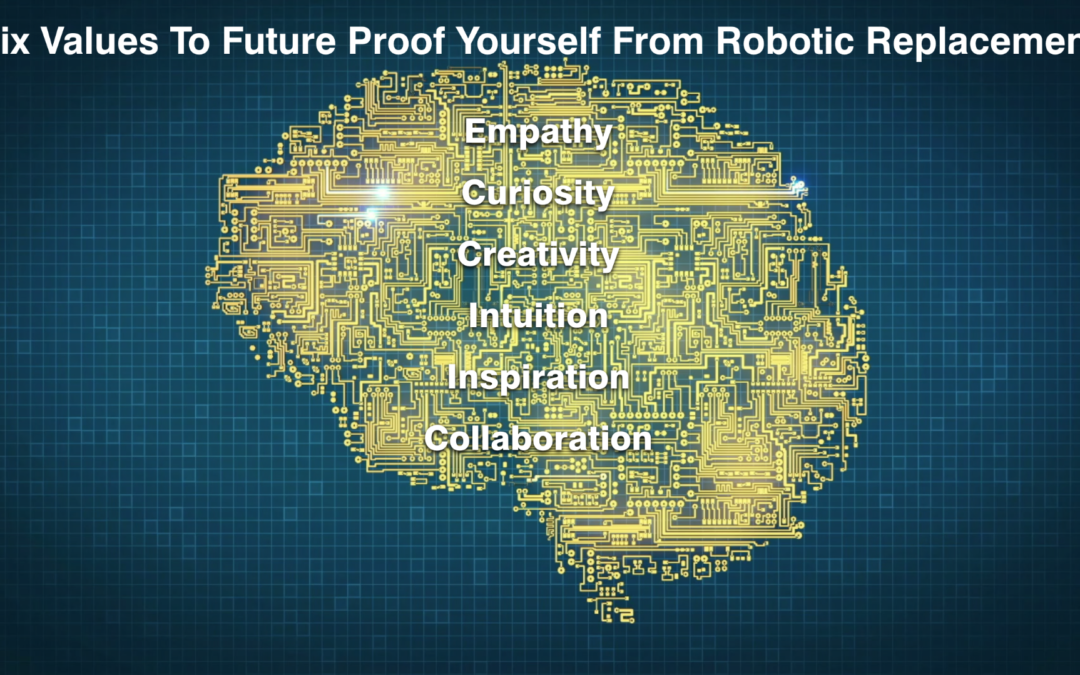Studies by Oxford University suggest robotics and automation will replace 47% of knowledge worker jobs over the next two decades. So if you are not planning on retiring in the next ten to twenty years, and let’s face it with average lifespan on the up and pension pots on the down many of us may never “retire” in the future, then you’ll probably find this article a great source for thought. At TomorrowToday we actually predict that by 2030 retirement as we know it will have disappeared, at least the concept as we know it will have been replaced with something else. Either way, the impact on automation will be felt by most of us. So we have to ask ourselves the question: What can humans do that computers, AI and smart machines can not do, well at least into the foreseeable future? The answer lies within six uniquely human values.
- The Empathy to care about things that are wrong and have the passion and energy to seek something better.
- The Curiosity to explore and go where others have never been.
- The Creativity to find exciting and new solutions.
- The Intuition to know when you have it wrong and the ability to the follow your gut instinct experimenting with a new route.
- The ability to Inspire others to join you on your crazy impossible and meaningful adventure.
- The ability to Collaborate with people and machines flexibility and in large numbers.
These are the six values every leader and person will need to harness to future proof themselves from robotic replacement
Take Boyan Slat an enthusiastic scuba diver who while diving in the Med noticed that there were more plastic shopping bags floating below the surface than jellyfish. Now if Boyan were a robo-scuba diver he may well have noticed and identified the shopping bags, but robo-boyan wouldn’t have cared. Boyan-the-human, on the other hand, became deeply concerned. He cared about the marine life and the lives of humans who depend on our oceans and his empathy drove him to start The Ocean Cleanup. His curiosity led him to discover that there are 5 trillion pieces of plastic currently littering our Ocean, almost 25 billion tonnes. This trash accumulates in 5 ocean garbage patches, the largest being the Great Pacific Garbage Patch, located between Hawaii and California, which is now the size of France or Texas. There are sections so thick and clogged up with plastic that ships can not sail through. His creativity led him to invent a V-shaped array, a floating barrier that captures plastic without harming marine life. His intuition helped him to understand that “If you try to fight the ocean, you will lose.” so the Ocean Cleanup Array was designed to be as flexible as possible. allowing it to move along with the waves, “which is key in ensuring the structure will be able to survive the most extreme conditions,” says Boyan. His TED talk has inspired millions of people to back his initiative and recognising that cleaning the oceans isn’t easy, Boyan has been carefully collaborating and working together with world-renown offshore companies and institutes.
As Economist Andrew McAfee suggests “There is no shortage of dystopian visions about what happens when our machines become self-aware, and they decide to rise up and coordinate attacks against us. I’m going to start worrying about those the day my computer becomes aware of my printer.” Well put, and as Boyan Slat’s story shows until then enjoy a human world augmented and made better by machines because of what makes us uniquely human, these six values.




Great article Jude. As leaders, we need to make sure we ignite the passion in the people around us to want to do at least those 6 things. Regards, Greg